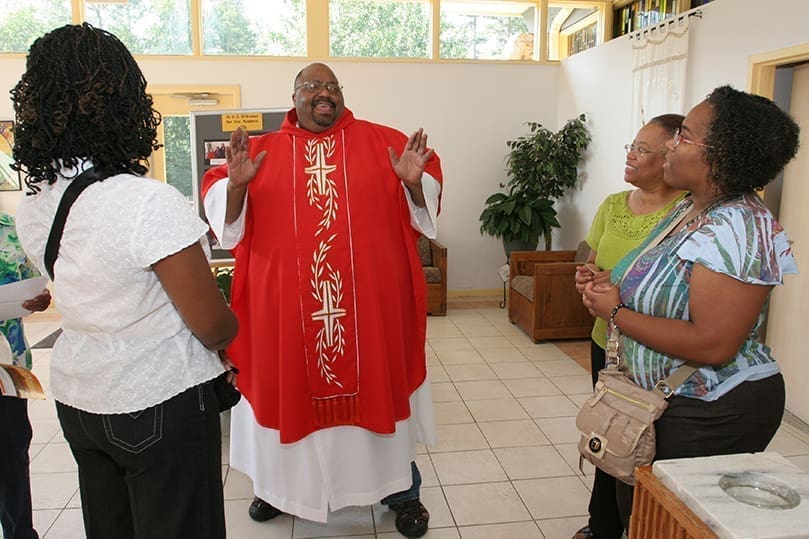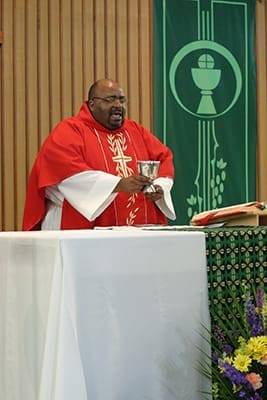 Photo By Michael Alexander
Photo By Michael AlexanderAtlanta
Father Wilkinson Discovers Blessings In Priesthood
By JEAN DRISKELL, Special To The Bulletin | Published August 19, 2010
In the priesthood, Father Bruce Wilkinson has found that Jesus is true to his word.
“Living for God is one of the greatest challenges and one of the greatest rewards I’ve ever experienced,” Father Wilkinson said. “It fulfills the promise Jesus gave to his disciples. Peter said, ‘We’ve given up everything to follow You.’ Jesus replied, ‘I assure you, you will receive more.’ He is absolutely true to his words. I have received more love than I could have ever imagined.”
Becoming a priest was not even an idea in Father Wilkinson’s mind while growing up in a close-knit Baptist family in Chicago.
“I lived in a Catholic neighborhood with Catholic friends in my childhood,” Father Wilkinson, pastor of Most Blessed Sacrament, Atlanta, said. “I never thought the Catholic Church was different. It was just another church to me.”
“As a Boy Scout, part of the experience then was to attend church,” he said. Father Wilkinson attended Baptist, Congregational, Lutheran and Methodist churches. “You didn’t have to believe or belong, but you had to go to church to be a Scout. I was in Scouting until 15 years old. Then I stopped Scouting and stopped going to church.”
Father Wilkinson said he debated between being an architect or a concert pianist. He decided to study engineering, with a leaning toward architecture, at Purdue University, West Lafayette, Ind. While attending there for one year before transferring to Morehouse College in Atlanta, he had a crucial experience.
“One night while I was playing cards I made a bet with a friend that whoever lost had to go to that person’s church,” he said. “I thought I would win. God had other plans. I lost. The other guy was Catholic.”
“About a week later I went to Mass. This was my first introduction to the Catholic Church. I said, ‘Wow! This is different.’ Everyone did everything together: standing, sitting, kneeling, and responding in unison,” he said.
He continued, “The next experience was during summer vacation in Chicago. They did the same thing there. It was six months between the first and second experiences at Mass. The pastor in Chicago told me to receive instructions when I got to Atlanta.”
“My parents wanted me to go to Morehouse. It was a family tradition,” he said. “The women in the family went to Spelman (College) and the men went to Morehouse.”
At Morehouse he studied engineering and architecture through a connection with Georgia Tech. While in Atlanta in 1973 and 1974 Father Wilkinson attended St. Anthony Church in the West End neighborhood. Father Eusebius Beltran (now Archbishop Beltran of Oklahoma City, Okla.) was pastor and Father Frank Giusta (now Msgr. Giusta) was assistant pastor, both teaching the classes Father Wilkinson attended to become Catholic. He was received into the Church at Easter 1974.
Although a Morehouse student, Father Wilkinson said, “I decided that wasn’t what I wanted to do. I wanted to go to seminary.”
What started his journey toward priesthood after becoming Catholic was watching Father Beltran celebrate Mass.
“I wondered what it was like being at the altar,” he said. “I became more involved serving at Mass, being a sacristan and lector. Becoming a priest was not a conscious decision.”
“A main exposure that opened the door to the priesthood was working at St. Anthony’s summer camp,” Father Wilkinson said. “I was able to stay at the rectory. Father Beltran would also invite me to visit someone at their home or visit the sick.”
He continued, “One day Father Beltran took me to the birthplace of the Healy family, an interracial family that lived in Georgia during the late 1800s. The mother was a former slave and the father was Irish Catholic. They had 11 children. Three of the sons became priests and two daughters became religious sisters. The oldest son became the first black bishop in America, the second son became president of Georgetown University, and the third son became a priest in the Archdiocese of Boston. I found this to be very inspirational to me.”
“These experiences made me consider the priesthood. I loved being involved with the children at camp. I liked serving Mass,” he said. “It made me want to really explore what a priest does besides being in the sanctuary.”
Father Wilkinson graduated from St. Meinrad Seminary in Indiana and Collegium Josephinum, Columbus, Ohio, where he finished the other three years in theology. “That’s when I realized Jesus is asking me to be a priest,” he said, “and Archbishop Donnellan wanted me.”

Father Bruce Wilkinson, pastor of Most Blessed Sacrament Church, Atlanta, is a Chicago native who graduated from Morehouse College, Atlanta, in 1976. After attending Saint Meinrad Seminary and Pontifical College Josephinum, he was ordained on June 27, 1981 by Archbishop Thomas A. Donnellan. Photo By Michael Alexander
As the only black student in seminary he experienced isolation and at times rejection.
“It was almost 100 years to the day that I was experiencing the same trials as the Healy brothers,” Father Wilkinson said. “God puts you in situations to experience the Passion of Jesus. I find that reassuring in the end. It gave me servitude.”
Father Wilkinson was a seminarian at Sts. Peter and Paul Church, Decatur, in 1977, and in 1980 was also a seminarian and deacon at Our Lady of Lourdes Church, Atlanta.
Father Wilkinson was ordained on June 27, 1981 by Archbishop Thomas A. Donnellan at the Cathedral of Christ the King, Atlanta. His first Mass was at Our Lady of Lourdes Church.
His first assignment was at Sts. Peter and Paul Church. “I was there four years. Father Ray Horan was the new pastor and Father Ignatius Ndibalema was assistant pastor,” he said. “The atmosphere of the parish and the people made it one of the best assignments even in the worst of times.”
He also served at St. Anthony’s, his home parish here in Atlanta, as assistant pastor and as pastor.
“The parish challenged me to again ask the question, ‘Why am I a priest?’” Father Wilkinson said. “St. Anthony’s tested my spiritual journey. So many good things also happened at that time.”
The parish had a school, day care, homeless and campus ministries.
“It was a big adjustment for the parish as well as for me. I learned very quickly to adapt,” he said. “This was something God enabled me to grow in, and he provided the people to support me.”
Father Wilkinson became pastor of Most Blessed Sacrament in 1992.
“I was part-time pastor and part-time Secretary for Black Catholics until 1994,” he said. “I didn’t want to come here. I wanted to go to school and pursue a degree to help with ministry. Archbishop (James P.) Lyke wanted me to come here.”
“Again God had a big surprise,” Father Wilkinson continued. “One of the greatest gifts is being pastor here. Became this parish has struggled it showed me how much faith people have in the love of their church and how generous they are. Now, 19 years later, I still feel blessed.”
Father Wilkinson was also Secretary for Black Catholics in the Archdiocese of Atlanta from 1983 to 1986 when the Office of Black Catholic Concerns was created. In 1986 Father Wilkinson helped lead an Archdiocesan Day of Reflection at Sts. Peter and Paul Church on Black Catholic Evangelization and the Black Community. He said that the same issues still exist today.
“Black high school students still leave the Church and never come back. The Church’s focus is now on Hispanics,” he said, “even though both have the same needs. The difference is that there never is the same intensity toward evangelization ministry in the black community.”
“Too many of our prisons are filled with young men in the prime of their lives, and 85 percent of black children are born out of wedlock, leaning them toward poverty,” Father Wilkinson said. “Human trafficking, drug and alcohol abuse, domestic violence are still concerns. Now we have HIV, which is under the radar for discussion. The illness rates for HIV are still unacceptable.”
The difference from the 1980s to 2010 is that “today Atlanta is a very different city. It’s more multicultural now. Issues remain but sifted to different groups: Hispanics, Asians and Africans,” he said.
About the expectations and experiences of being a priest Father Wilkinson said, “The biggest expectation was preaching. It never occurred to me to preach. I basically grew up shy and couldn’t imagine speaking in front of people. Now I love preaching. It’s so important to tell the story of Jesus and the love of God.”
“Unfortunately it was one of the least subjects we had in seminary,” he continued. “While at Josephinum I took two courses at a Southern Baptist seminary. It was wonderful. It really helped me to become a better preacher.”
As for liturgy, Father Wilkinson said, “Now I find liturgy to be a much more personal encounter with the Lord Jesus. I always felt that. I feel it more now, even when I visit a parish and sit in the pew. It is still a joyous, mystical gift Jesus has left us.”
“Being a priest is not what you give up. It’s what you receive. It’s a blessing,” Father Wilkinson said.